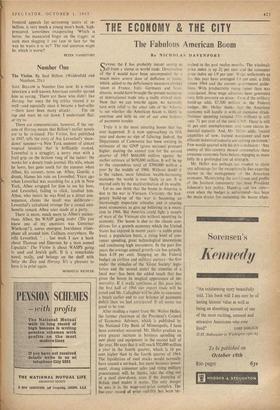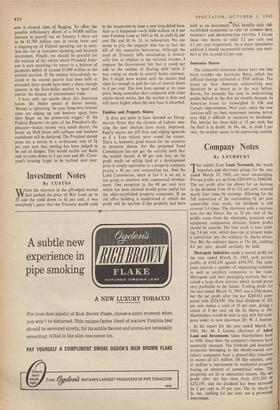THE ECONOMY & THE CITY
The Fabulous American Boom
By NICHOLAS DAVENPORT
SA V1NG the £ has probably meant saving us all from a slump in world trade. Devaluation of the t, would have been accompanied by a much more severe dose of deflation at home, which, added to the deflationary measures already taken in France, Italy, Germany and Scan- dinavia, would have brought the present easing-up of international trade into a really critical state. Now that we can breathe again. we naturally turn with relief to the other side of 'the Atlantic to see whether the American boom is likely to continue and help us out of our own balance of payments trouble.
Truly it is the most amazing boom that has ever happened. It is now approaching its fifth year and shows no sign of faltering. Indeed, the Department of Commerce has been revising its estimates of the GNP (gross national product) higher, making the annual rate for the second ,quarter of 1965 $666,000 million against ihe earlier estimate of $658,000 million. It will he up to the stupendous total of $700,000 million a year by the middle of 1966. Without doubt it is the richest, most fabulous wealth-increasing economy the world is ever likely to see. It is marred only by the maldistribution of its wealth.
Let no one think that the boom in America is due to the war in Vietnam. Certainly, the •bud- getary build-up of the war is becoming an increasingly important stimulus and is causing most economists to give up believing in a reces- sion in 1966. But America could fight a couple of wars of the Vietnam size without upsetting its economy. The boom is due to the classic con- ditions for a growth economy which the United States has enjoyed in recent years—a stable price level, a population burst, a rising level of con- sumer spending, great technological innovations and continuing high investment. In the past five years the average annual growth rate has actually been 4.19 per cent. Stepping up the Federal budget on civilian and military outlays—the first under the stimulus of the 'Great Society' legis- lation and the second under the stimulus of a local war—has been the added touch that has given the boom its magical appearance of im- mortality. If it really continues at this pace into the first half of 1966 our export trade will be saved and Mr. Callaghan will be able to announce a much earlier end to our balance of payments deficit than we had anticipated. It all seems too good to be true.
After reading a report from Mr. Walter Heller, the former chairman of the President's Council of Economic Advisers, which is published by the National City Bank of Minneapolis, I have been somewhat reassured. Mr. Heller predicts an even greater increase in business spending on new plant and equipment in the second half of the year. He says that it will reach $52,000 million a year in the fourth quarter, which is 10 per cent higher than in the fourth quarter of 1964. The liquidation of steel stocks would normally have caused a set-back, but more business invest- ment, strong consumer sales and rising military procurement will, he thinks, take the sting out of a steel slow-down, even if the dumping of British steel makes it worse. The only danger he sees is in the wage-cost-price complex. The five-year record of price stability has been tar-
nished in the past twelve months. The wholesale price index is up 23 per cent and the consumer price index up 1.9 per cen: Wage settlements so far this year have averaged 3.t per cent, a little above 1964 and the currem government guide- lines. With productivity rising taster than was anticipated, these wage advances have generated very little pressure on prices. Even if the military build-up adds $7,500 million to the Federal budget, Mr. Heller thinks that the American economy will handle it without excessive strain. Defence spending (around 551) million) is still only 73 per cent of the total GNP There is still 43 per cent unemployment and some excess in- dustrial capacity. And, Mr. Heller adds, 'record quantities of new, trained manpower and new efficient industrial capacity are coming on-stream.' Few would quarrel with his dry conclusion: 'Any enemy of this country should contemplate these awesome economic facts before engaging us more fully in a prolonged test of strength: Mr. Heller was perhaps too modest to claim any advantage for the exceptionally fine expertise shown in the management of the American economy. Maintaining the confidence and profits of the business community has been President Johnson's key policy. Handing cut tax cuts— even when the budget is unbalanced—has been the main device for sustaining the boom when- ever it showed signs of flagging. To offset the possible deflationary effects of a $4;000 million increase in payroll tax on January 1 there are to be $1,700 million cuts in excise taxes and a stepping-up of Federal spending, not to men- tion the rise in consumer spending and business investment. Finally, we should be grateful for the wisdom of the advice which President John- son is now receiving—to revert to a balance of payments deficit of around $1,000 million as the normal position. If the surplus miraculously se- cured in the second quarter had been held or extended there would have been a sharp enough squeeze in the Euro-dollar market to upset and restrict the finance of international trade.
I have only one qualm about this American boom. Mr. Heller speaks of dearer money. `Money is tightening,' he says, long-term interest rates are edging up and bankers again have their finger on the prime-rate trigger.' If the Federal Reserve—in spite of the President's dis- pleasure—makes money very much dearer, the boom on Wall Street will collapse and business confidence will be shattered. The President should press for a return to a re-discount rate of 31 per cent now that sterling has been judged to be out of danger. This would enable our Bank rate to come down to 5 per cent and Mr. Cross- man's housing target to be realised next year.







































 Previous page
Previous page